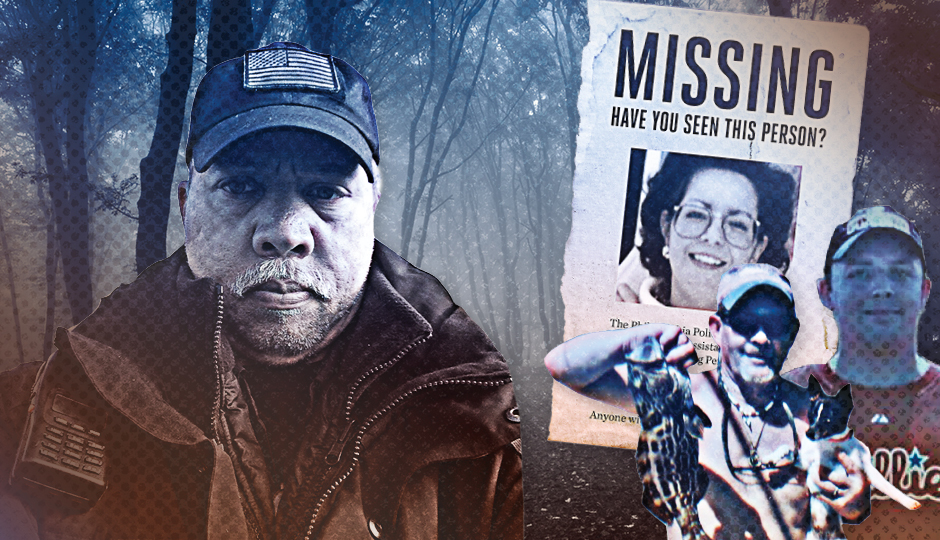Meet Philly’s “Dr. House” of Missing Persons

Mark G. Hopkins (left) with images of missing persons, from left, Angelina Cocuzzo, Barnett Zeldin and Phil Luke. Background photo | Shutterstock. Photo illustration | Alyse Moyer
It was raining sideways and hard that day in January, as though the weather had a grudge against all the kind-hearted volunteers in reflective vests gathered beneath tarps in a Philadelphia parking lot.
The members of Greater Philadelphia Search and Rescue (GPSAR) and Burlington County K9 Search and Rescue were waiting for the arrival of GPSAR’s chief, Mark G. Hopkins, who would split them into walkie-talkie-equipped groups for “tasks,” which meant searching a specific plot of land, sometimes with trained dog in tow, for a person who’d gone missing in the vicinity. It was cold and biblically wet, but no one in the group — men and women of all ages — complained. Instead, one ribbed another about his wet-weather gear, which was brand new, while another petted a dog that was anxious to get working.
When Hopkins arrived he turned his attention to the search, but stopped briefly to look at my jalopy parked nearby. “Remind me to tease you about your car,” he said to me. “I don’t want to forget.” And then he walked over to the operations table, addressed his team and organized the search.
This is the essence of the Mark Hopkins I have come to know: Whereas Emerson once noted that “there is always time for courtesy,” I think Hopkins would say, “There is always time to bust someone’s balls,” though he might not put it in those words. A man without vices, he doesn’t drink, he doesn’t get high, and he’s generally not vulgar in expression. In fact, he says his only vice is his obsession with missing persons, which — if you have to have a vice — is a pretty generous one to have.
•
I MET HOPKINS as a result of my interest in Christopher Tully, a Bucks County teacher who went missing in early January. (The all-volunteer GPSAR was called in to help with the case, and they did find Tully’s body in the third week of January.) Despite my specific interest in Tully, Hopkins’s passion for the subject of missing people in general is contagious. He is fiercely devoted not only to finding people, but to educating people so they understand why friends and relatives go missing in the first place. He is very serious about fairness for the missing, about dignity, about resolution for family members. His mission in life — he’s been doing this for 20 years — is one of love for fellow humans. Yet therein lies the contradiction: He loves his fellow humans most when they’re gone.
“People are very annoying,” he says. “I am a misanthrope. But I like order. And everybody should get the same level of service. It should be fair. And I don’t like to think that someone got screwed.” His friends think it’s a funny contradiction in his personality, but he says, “I’d rather have some misanthrope who gets off his butt and comes out and helps than some nice person who sits at home and clicks ‘Like’ or goes ‘So sad, so so sad’ — because that’s not enough.”
And this misanthrope — who compares himself to Hugh Laurie’s TV character of Dr. Gregory House — does care deeply, which is why he’s written numerous letters to Mayor Michael Nutter to try to standardize the procedure by which Philadelphia and surrounding counties approach missing persons cases. Here’s a part of his most recent letter:
Mr. Mayor, I am the Chief of Greater Philadelphia Search & Rescue. We do nothing but look for lost and missing persons throughout the area. We get called in by multiple agencies and some of our biggest supporters are senior officers in Philadelphia. I’d like the opportunity to speak with you on procedures for missing person incidents. As a lifelong resident of the city and head of my department I want to see the city get the best service it can. With this in mind I would also like to see a base level system that is applied equally to all missing persons as they deserve the same initial investigative attention at the onset.
Hopkins has taught me that the way searches happen now in Greater Philadelphia is fairly haphazard. Maybe I’ve been watching too many TV shows created by Dick Wolf, but I just assumed there were very set steps. Not so. It varies widely depending on variables like demographics and time of year. The amount of attention each case gets varies too: The case in Manayunk of missing student Shane Montgomery — which GPSAR also worked on — received daily Today show updates. Other cases go unacknowledged except by closest family and friends. “I used to believe it was racial bias; lately I don’t think it’s race,” Hopkins says. “Social media is inflating and driving things.” He also says it depends on the power of the narrative; some are simply more compelling as stories. And then there are reporters, like me, who connect with a particular case for personal reasons. But that’s so arbitrary. For example, what about Phil Luke?
Huh? Who’s Phil Luke?
Exactly.
•
THIRTY-ONE-YEAR-OLD PHIL LUKE went missing last July in Berks County. He planned his disappearance for months before he left. “He had no criminal background, he had no drugs, he had nothing wrong in his life other than he was fed up with the world,” says Hopkins. “He is a true mystery. Some people disappear but they’re not mysteries. Some people you have a strong feeling of where they are. I don’t have a strong feeling of where he is. He just walked off the grid.”
Something about this particular case has gotten to Hopkins. Perhaps he can relate to Luke’s precision. “He was so careful. He went to a great effort to get rid of anything that the dogs could get scents off of. He cleaned the environment. He [wiped] all his computers. He wiped his phones. He left everything behind. He didn’t have any tracks for days before he went missing.” There has been only one video sighting of him that showed that he left home of his own free will, and since then … nothing. Yet there’s been virtually no press coverage — and in this case, press coverage might actually help.
Hopkins also mentions the puzzling cases of Angelina Cocuzzo, a reclusive 61-year-old businesswoman who struggled with depression, and Barnett Zeldin, a hunter whose truck was found with its keys in the ignition, cell phone on the dashboard, and dog Taffy inside. Both have been missing for more than a year. There are others too; he maintains various websites with information about open cases. Channel 10 has recently started a project called Finding the Forgotten devoted to missing persons in our area, and some have been gone so long, it’s hard to be optimistic. And it’s true, Hopkins says, “most people don’t have the means to go start a new life on a Caribbean island. It’s been very rare that someone has run away and started a whole new life.”
Hopkins can think of one case GPSAR worked where a guy disappeared, moved to Delaware, and ended up working in a bike shop. While he was gone, he monitored — and commented on — the Facebook page dedicated to his disappearance. And then there’s Andrew Biddle, the alleged fraudster who faked his own boating death and just this month came back from wherever he actually did run away to.
•
BUT THE VAST majority of people GPSAR finds are dead. Which means that Hopkins has seen a lot of dead bodies. Does that freak him out?
“It surprises me but it doesn’t shock me,” he says. “There’s a solemn bearing-witness that comes with it. Every now and then there’s one that sticks with me, and as much as I hate that, I need that to happen because I don’t want to be numb to it.”
The cases where people are found alive are defined by a couple of things: the amount of time they’ve been missing, and the reasons they’re gone.”If we get called earlier and the right groundwork is laid, we do have a great success rate with people being found alive. You can find people. We’ve found people right before they’ve made that decision [to kill themselves]. And that’s good but that’s also luck. Other people also needed to be there for them. Somebody who walks away with dementia or someone who runs away is a more optimistic case than somebody that leaves a note. I find that most of the time the people who leave the notes are serious about it. A lot of times with suicide, there’s been prior attempts.”
When it comes to dementia, time is of the essence, especially if it’s the first time the person has disappeared. “Most people do not expire on the first time. That’s a great hope for optimism. It’s like the first one’s free.”
•
HOPKINS HAS ALL kinds of pro tips he’s gleaned from doing this for 20 years — odd little factoids like “the first one’s free” — that he’s trying to systematize. Another truism: “Usually grumpy old busybodies are your best sources of information.” There was a case where an old man remembered a missing person because the person had gone through his yard and he didn’t like kids in his yard. That grumpy old man proved key to the case.
Sometimes Hopkins’s expertise can rub folks the wrong way. He’s been called “arrogant,” “insensitive,” “obnoxious,” “stubborn” — and that’s sugarcoating it. In one case a detective told GPSAR not to search an area but they did it anyway — and found the body they were searching for. The detective apologized. “But you can’t just be a caustic asshole,” Hopkins says of himself. “At the end of the day, you have to be right.”
And there’s no doubt that in the course of 20 years, Hopkins has been right a lot. Which is why it’s disturbing to hear that he’s planning to retire from search-and-rescue work.
“I would like to stop soon. I would like to be able to turn my phone off,” says Hopkins wearily.”I would like to not have body bags in my car.” He’d like to get out of the game before it burns him out completely, and while he can still be a resource to the next guy. To that end, he’s even thinking of writing legislation called the Brother’s Keeper Law, which would codify his ethos of shared responsibility: “People need to pay attention to each other.”
But in the meantime, he’s still out there in the rain and wind and all kinds of weather searching for those who have walked away.
Follow @lspikol on Twitter.


